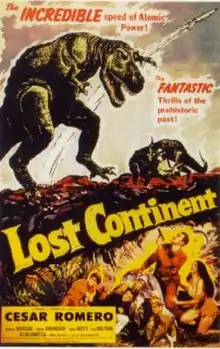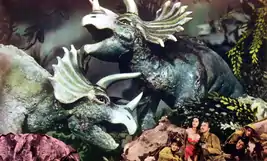Lost Continent (1951 film)
Lost Continent is a 1951 American black-and-white science-fiction film drama from Lippert Pictures, produced by Jack Leewood, Robert L. Lippert, and Sigmund Neufeld, directed by Sam Newfield (Sigmund Neufeld's brother), that stars Cesar Romero, Hillary Brooke, Whit Bissell,[1] Sid Melton, Hugh Beaumont and John Hoyt.[2]
| Lost Continent | |
|---|---|
 Theatrical release poster | |
| Directed by | Sam Newfield |
| Produced by | Jack Leewood Robert L. Lippert Sigmund Neufeld |
| Written by | Orville H. Hampton Richard H. Landau Carroll Young (story) |
| Starring | Cesar Romero Hillary Brooke Chick Chandler Sid Melton Hugh Beaumont John Hoyt |
| Music by | Paul Dunlap |
| Cinematography | Jack Greenhalgh |
| Edited by | Philip Cahn |
| Distributed by | Lippert Pictures |
Release date |
|
Running time | 83 minutes |
| Country | United States |
| Language | English |

An expedition is sent to the South Pacific to search for a missing atomic-powered rocket in order to retrieve the vital scientific data recorded aboard. On an uncharted island they discover more than their rocket, now crashed atop a mysterious plateau, they find a lost jungle world populated by prehistoric dinosaurs.
Plot
Maj. Joe Nolan (Cesar Romero) is the head of a South Pacific expedition to retrieve an atomic-powered rocket that has vanished without a trace. His fellow serviceman and pilot, Lt. Danny Wilson (Chick Chandler), is also an expedition member. Aircraft mechanic Sgt. William Tatlow (Sid Melton) has also been recruited. The expedition includes the three scientists who helped build the rocket.
Their transport aircraft mysteriously crash-lands on a remote, unknown tropical island in the area where the rocket was lost on radar. Only two occupants are left on the island, a native woman (Acquanetta) and her young brother. The woman indicates something fell from the sky atop the forbidding, cloud-shrouded plateau that dominates part of the island. The rocket's fiery arrival caused the rest of the native population to abandon the island.
Expedition member Stanley Briggs (Whit Bissell) dies accidentally on the steep ascent up the escarpment. After long stretches of rock climbing, the expedition emerges from what turns out to be a toxic gas cloud cover. They discover a lush, prehistoric jungle inhabited by various dinosaurs and a large field of uranium, which is what has disabled their electronic tracking equipment.
They come upon a Brontosaurus, which attacks Robert Phillips (Hugh Beaumont) as he retreats up a tree. Nolan and Wilson open fire, but they quickly discover that the dinosaur's thick hide absorbs bullets with little effect. Later that night they set up camp. When Nolan awakes, he finds Phillips and Russian scientist Michael Rostov (John Hoyt) gone. Phillips has gotten himself stuck in a large rock crevice near a Triceratops. Nolan accuses Rostov of arranging the accident on purpose, but Rostov insists that he was helping Phillips. The Triceratops nearly attacks the group, but another makes a challenge and the two dinosaurs fight to the death.
Nolan is convinced that Rostov, the scientist who helped make the rocket, is up to no good because he also appeared to be able to save Stanley Briggs on their climb up but failed to do so. Eventually, Rostov reveals himself to be a victim of the Holocaust in which he lost his wife and unborn child.
Wilson later shoots a Pterosaur for food near the rocket's landing site. The group soon discover the rocket is surrounded by a Brontosaurus and a pair of Triceratops, but Nolan devises a strategy that results in scaring off the dinosaurs with their weapons. Rostov and Phillips retrieve the needed data from the rocket. His back turned, Tatlow is gored to death by an angry Triceratops, just as it is shot by Nolan and Wilson. After the team finishes a grave, violent earthquake tremors begin, and the team makes a hasty retreat down the plateau.
The four members manage to successfully return to the island's flatland, just in time to escape the island using a native outrigger canoe. The survivors watch from a distance as the island is first rocked by more violent earthquakes and then a catastrophic eruption of the island's formerly dormant volcano begins, which destroys everything.
Cast
- Cesar Romero as Maj. Joe Nolan
- Hillary Brooke as Marla Stevens
- Chick Chandler as Lt. Danny Wilson
- John Hoyt as Michael Rostov
- Acquanetta as Native girl
- Sid Melton as Sgt. William Tatlow
- Whit Bissell as Stanley Briggs
- Hugh Beaumont as Robert Phillips
- Murray Alper as Air Police Sergeant
Production
Lost Continent was a low-budget film shot in just 11 days from April 13 to late April 1951 at Goldwyn Studios.[3][4]
Black-and-white footage set atop the prehistoric escarpment was tinted a mint-green color on all theatrical release prints to produce an eerie, other-worldly effect. The general plotline of the film strongly resembles that of Sir Arthur Conan Doyle's novel, The Lost World.[2]
Reception
Lost Continent was not able to overcome its low-budget origins despite having former screen idol Cesar Romero in a leading role. A later review clearly identified the main issue: " . . . a good third of the movie is spent showing our characters climbing the same styrofoam set prop from different angles . . . The pacing is pretty slow: the first twenty minutes is spent introducing the characters; the next 20 is spent having them climb up a mountain, and then jamming what little action there is into the remaining run time—all of which you would have seen in the trailer".[5]
MST3K
Lost Continent was featured in a Season 2 episode of Mystery Science Theater 3000 (Dr. Forrester and TV's Frank taunted Joel Robinson before the film began with the words "Rock Climbing." In a host segment Michael J. Nelson portrayed actor Hugh Beaumont as a member of the Four Horsemen of the Apocalypse).
The Lost Continent episode of MST3K was released by Shout! Factory as part of their Volume XVIII series DVD boxed set.
See also
References
Notes
- TCM.com
- Warren 1982, pp. 151–163.
- "Original print information: 'Lost Continent' (1951)." Turner Classic Movies. Retrieved: February 3, 2015.
- THOMAS F BRADY (Apr 12, 1951). "FILM STUDIO'S DEAL FOR MUSICAL IS OFF". New York Times. ProQuest 112013155.
- Ulmer, Jeff. "Image Entertainment presents 'Lost Continent' (1951)." digitallyobsessed.com, December 6, 2001. Retrieved: February 3, 2015.
Bibliography
- Warren, Bill. Keep Watching The Skies Vol. I: 1950–1957. Jefferson, North Carolina: McFarland & Company, 1982. ISBN 0-89950-032-3.
External links
| Wikiquote has quotations related to: Lost Continent (1951 film) |